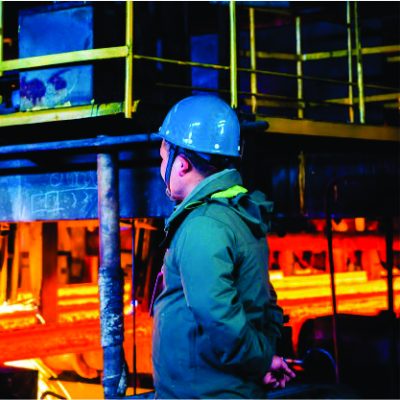Energy Efficiency and 4.0 Industry
Publicado em 30 de July de 2020

During the speech IoT, 4.0 Industry and Energy Efficiency, the chemichal engineer Mr. Cláudio Golbach said that, in Brazil, Energy Efficiency has been seen as electrical energy efficiency (lighting, cables, engines). In that context, the thermal issues are rarely addressed and, for the speaker, this is the aspect in which the greatest waste occurs.
To exemplify the question, Cláudio comments that, when choosing to change a lamp, a 40W incandescent lamp is replaced by a 9W LED lamp. Thus, consumption drops from 40W/s to 9W/s and, by changing several lamps, you can save 1kW. In a steel mill, on the other hand, when the metal is heated to 1500 degrees in a pan, the outside of the pan is at a temperature of 350 degrees. However, by changing the thermal insulation of the pan, it loses less heat through the walls. Thus, for a typical pan, 3m in diameter and 3m in height, by modifying the external thermal insulation, the heat loss through the pan walls is reduced. By reducing the external temperature from 350 to 300 degrees Celsius, the difference is 93 kW. Each pan consumes 93kW more and then money is lost due to lack of thermal energy efficiency.
The Engineer also commented that it is possible to use a formula (XYZ) to calculate consumption per consumer unit, area, equipment or device. Thus, when defining XYZ, it is possible to see what can be improved in terms of energy efficiency. For this, X is considered as the amount currently consumed by the device, information that can be discovered through the Internet of Things (IoT), which allows remote monitoring of the device; Y, in turn, establishes the amount that could be consumed; Finally, Z establishes the cost to reach the consumption quantity X instead of Y.
The variables X, Y and Z depend on knowledge and investment and, therefore, it can be said that energy efficiency also depends on knowledge and capital, since to monitor, acquire knowledge and act, replacing equipment or making improvements, it is necessary to invest. In the words of the speaker, this is what makes energy efficiency in Brazil very often unfeasible.
Golbach also commented that energy efficiency is granular, that is, several small actions are taken to achieve a great result. However, scholars comment that, in the post-pandemic resumption, energy efficiency can play an important role, since there will not be much capital to carry out major works, but despite this, it will be possible to carry out few and small works and, with energy efficiency projects , a good return can be achieved. In addition, it is said that, macroeconomically, through energy efficiency more people will return to work, which will contribute to the distribution of income.
Finally, the engineer pointed out that, by combining 4.0 industry with energy efficiency, sustainable development is achieved, which in turn encompasses economics, ecology and social issues. The current situation calls for people, the economy and the environment to be involved and working together to make the change happen, since, as a result of the pandemic, 2.8 gigatonnes of CO2 are no longer emitted into the atmosphere. Despite this, after crises, peak consumption usually occurs and, therefore, it is essential to act to prevent this from happening, applying energy efficiency actions in the production process and assuming, as consumers, a conscious role.
REFERENCES:
JORNADA DE EFICIÊNCIA ENERGÉTICA. IoT, Indústria 4.0 e eficiência energética na prática. Disponível em: https://www.youtube.com/watch?v=Tx2lM9vMYZU